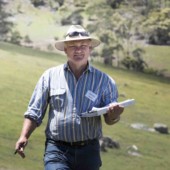Why intangible assets matter for every agrifood startup
People will only pay for what they cannot steal, according to EverEdge Managing Director, Michael Masterson who shares a wealth of experience in valuing intangible assets and helping businesses, like Rhino-Rack and infant formula and milk company Beta A2 – find their ‘secret sauce’ and how to keep it safe.

EverEdge Managing Director, Michael Masterson, talks about the reality of intangible asset theft – it happens all the time – and Rhino-Rack’s Chief Intangible Assets Officer, Ernesto Fernando explains how to value your ‘secret sauce’ in evokeAG. and EverEdge’s collaborative four-part webinar series, Intangible Matters.
According to Michael, the most valuable intangible assets are not what one might think and that most of the clients EverEdge has dealt with weren’t previously aware of them. “Of 2,000 clients that we’ve worked with, only one of them had intangible assets on the risk register.”
“A lot of people think it would be things like patents when actually, patents are well down the list. One of the most valuable assets inside a manufacturing business, for example, is often the bill of materials. It is like the map to where all the treasure is buried inside the business. It tells someone wanting to acquire or steal those assets, either legally or non-legally, where to find your input costs, supplier information, etc.”
RELATED: Explore growAG.‘s commercial opportunities
Five types of intangible asset risk
After differentiating between ‘good’ risk and ‘bad’ risk, or opportunity and distress, Michael enumerated the different types of intangible asset risk. “Companies leak, not just a little bit, like a fire hydrant. And 80% of companies cannot prove they own their own assets, i.e., tangibles are recorded on the balance sheet but intangibles are not and they are often developed with partners, external contractors etc.”
Continuing the theme of unforeseen risks, Michael discussed the risks around open-source software. “Who owns the code, you or the original developer? It all comes down to what the license agreement says. It is also the easiest way to get backdoor Trojans into code bases, we saw this with the Sony rootkit hack. Lastly, toxic license terms. With some open-source software, you can use it as long as you are not generating a profit but when you start to generate a profit, the original owner can end up owning your entire codebase.”
RELATED: Understanding your company’s brand value is everything
Michael added that brand risk was an ever-increasing issue. “Almost every second day we’re dealing with some sort of trademark issue. There are two kinds of trademark, there is a logo mark and what is called a wordmark, it is the word like what your company is actually called, and how you describe that company. Wordmarks are typically much more valuable than the logo mark and in particular, early-stage startups only have the logo, they don’t have the word.”
“The last risk is that if you go anywhere near the US, it’s not if you’ll be sued – it’s when.”
RELATED: Harvest optimisation technology, a smart move for Australia’s viticulture industry
Intangible asset theft ‘happens all the time’
Gill Burke, Co-Founder and Director of infant formula and milk company Beta A2 brought the concept of risk to intangible assets life when she described her company’s near-death experience.
“Within a few months of starting up, two people posed as interns with fake IDs and infiltrated one of our very trusted advisors. They copied everything, [the details of our infant formula] and sent it outside of the company. They effectively sold our company and if one of the co-founders [had not noticed something was not right] we’d be building a company for somebody else and not even know it.” When Beta A2 got no response from the police, they engaged with ASIO, only to be told, ‘this happens all the time.’
When questioned as to what she would do differently, Gill said, “I really have moved from the idea of our physical product being our asset to what we know [being our asset]. A key question I asked and still ask is, ‘what is special about this?’ And if somebody asks me a question, I [ask myself], do they actually really need to know the answer to that?”
RELATED: What is impact investing and why it’s not charity
“[On top of that there are some things that are not electronic anywhere, or if they are electronic, they are on a laptop that’s never ever been connected to the Internet. But for a lot of our stuff, we have gone back to paper [which has its challenges]. My bank, will go, can you just fill this out electronically and send it back to me via email? No. We’ll print out the forms, fill them in, and hand-deliver them.
Business’s ‘Crown Jewels’ on a private mobile phone
Ernesto Fernandez, General Manager and Chief Intangible Asset Officer at Rhino-Rack – is the first Chief Intangible Asset Officer in Australia and advocated the importance of identifying an organisation’s intangible assets, a focus that has paid off with Rhino-Rack recently being acquired for just under $250 million. Early on in the process, Ernesto reflected on what’s valuable: “The equipment, the process, the knowledge that checks that we produce a reliable product. How is that documented? Who owns that?”
“The response was: ‘That’s sitting on such and such’s phone’. Who owns the phone? Well, he owns the phone. And you can see how this perpetuates into a very deep and quite concerning discussion. Here we are, a $100m plus business and some of our staff have the assets that are the crown jewels on their private phones. That is when it actually made sense. And obviously, then, it is about how do you bring the rest of the business along that journey to start that process of identifying what are the important intangibles today, that we just take for granted.”
Want to know more about intangible assets? Register for the upcoming webinar: Going global – strategies for success on 18 November here.
Enjoyed this story? Want to learn more about the Asia Pacific region’s innovative agrifood tech ecosystem? Sign up for our newsletter here and receive fresh stories about global leaders, farmers, startups and innovators driving collaborative change.
